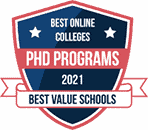
Ph.D. in Education – Educational Technology & Online Learning
Use Technology to Advance Classrooms & Your Career
Do you have the desire to facilitate improved performance through technological processes and resources, and go further too? Regent’s Doctor of Philosophy in Education – Educational Technology & Online Learning prepares you for teaching and leadership positions in K-12, higher education, or corporate learning settings. The research-based Ph.D. can prepare you more specifically for a career in academia. You can also study the principles of curriculum, instruction, assessment, and evaluation, and apply them to an online education setting.
INCREASE YOUR EARNING POTENTIAL
Capitalize on a higher salary with your Ph.D. degree.
EXPAND YOUR CAREER PATH
Take your career to the next level with exciting leadership opportunities.
MAKE AN IMPACT
Present ground-breaking research to improve the world of education. Presented from a Christian worldview, this specialty degree is supported by award-winning faculty in Virginia Beach.
ALIGN YOURSELF WITH EXCELLENCE
Regent has been ranked among the Top National Universities by the U.S. News & World Report (2026). Our programs have also been ranked among the Top 10 Best Online Graduate Education Programs in Virginia for 13 years in a row (2013-2025). Our graduates are empowered to make a difference in lives, which has led to more than 900 alumni being recognized as Teachers of the Year in Hampton Roads since 2004.
Please complete the Request Information form on this page to learn more about this program.
On completing the Ph.D. in Education – Educational Technology & Online Learning degree, you can:
- Explain the online learning instructional design process and practices of effective teaching and learning with technology.
- Research solutions to online-learning problems and ways to deliver research-based educational concepts or services to individuals or groups at a distance.
- Examine strategic planning and the role of program evaluation in the planning/implementation/evaluation cycle to include the curriculum planning process.
Career Opportunities
- University Faculty
- Program Director
- Technology Administrator
Students should refer to their catalog or audited degree plan (ADP) for required courses to complete their degree.
2025-26 Semester Check-In Deadlines
All students are expected to check-in for the semester two weeks before the session start date. Students should apply, be accepted, enroll in their first courses, and confirm a plan to pay for their courses prior to this date.
| Session | Semester Check-In | Session Start Date |
|---|---|---|
| Session A | Friday, August 15 | Monday, August 25 |
| Session M | Friday, September 12 | Monday, September 22 |
| Session B | Friday, October 17 | Monday, October 27 |
| Session C | Wednesday, January 7 | Monday, January 12 |
| Session T | Friday, January 30 | Monday, February 9 |
| Session D | Friday, March 6 | Monday, March 16 |
| Session E | Friday, May 1 | Monday, May 11 |
| Session F | Friday, June 12 | Monday, June 22 |
Admissions Requirements
Step 1: Apply to Regent University
Submit your application using the Regent University Online Application.
Note: If you are unable to complete our application due to a disability, please contact our Admissions Office at 757.352.4990 or admissions@regent.edu and an admissions representative will provide reasonable accommodations to assist you in completing the application.
Step 2: Submit Your Unofficial Transcripts
Submit your unofficial transcripts to regent.edu/items.
Upon submitting your application, you will receive an email requesting authorization for Regent University to obtain your official transcripts from your U.S. degree-granting institution. International transcripts must be evaluated by a NACES or NAFSA approved agency.
Step 3: Submit Your Government-Issued ID
To ensure academic integrity, Regent University requires a copy of a government-issued ID. Please submit a scanned copy or photograph of it to regent.edu/items.
Please feel free to contact the Office of Admissions at 757.352.4990 or admissions@regent.edu should you have any further questions about the application process.
Note: All items submitted as part of the application process become the property of Regent University and cannot be returned.
Part-Time Students
| Degree | Tuition Cost Per Credit Hour | Average Credit Hours Per Semester | Average Tuition Per Semester |
|---|---|---|---|
| Master of Arts (M.A.) | $585 | 6 | $3,510 |
| Master of Education (M.Ed.) | $585 | 6 | $3,510 |
| M.S. in Library Science | $700 | 6 | $4,200 |
| Educational Specialist (Ed.S.) | $820 | 6 | $4,920 |
| Doctor of Education (Ed.D.) | $820 | 3 | $2,460 |
| Doctor of Philosophy (Ph.D.) | $820 | 3 | $2,460 |
Full-Time Students
| Degree | Tuition Cost Per Credit Hour | Average Credit Hours Per Semester | Average Tuition Per Semester |
|---|---|---|---|
| Master of Arts (M.A.) | $585 | 9 | $5,265 |
| Master of Education (M.Ed.) | $585 | 9 | $5,265 |
| M.S. in Library Science | $700 | 9 | $6,300 |
| Educational Specialist (Ed.S.) | $820 | 9 | $7,380 |
| Doctor of Education (Ed.D.) | $820 | 6 | $4,920 |
| Doctor of Philosophy (Ph.D.) | $820 | 6 | $4,920 |
Student Fees Per Semester
| University Services Fee (On-Campus Students) | $900 (Fall & Spring) $750 (Summer) |
|---|---|
| University Services Fee (Online Students) | $750 |
PART-TIME STUDENTS
| Degree | Tuition Cost Per Credit Hour | Average Credit Hours Per Semester | Average Tuition Per Semester |
|---|---|---|---|
| Master of Education (M.Ed.) | $565 | 6 | $3,390 |
| Educational Specialist (Ed.S.) | $800 | 6 | $4,800 |
| Doctor of Education (Ed.D.) | $800 | 3 | $2,400 |
| Doctor of Philosophy (Ph.D.) | $800 | 3 | $2,400 |
Full-Time Students
| Degree | Tuition Cost Per Credit Hour | Average Credit Hours Per Semester | Average Tuition Per Semester |
|---|---|---|---|
| Master of Education (M.Ed.) | $565 | 9 | $5,085 |
| Educational Specialist (Ed.S.) | $800 | 9 | $7,200 |
| Doctor of Education (Ed.D.) | $800 | 6 | $4,800 |
| Doctor of Philosophy (Ph.D.) | $800 | 6 | $4,800 |
Student Fees Per Semester
| University Services Fee (On-Campus Students) | $850 (Fall & Spring) $700 (Summer) |
|---|---|
| University Services Fee (Online Students) | $700 |
*Rates are subject to change at any time.
Ph.D. Requirements
A Ph.D. student will (a) complete 21 hours associated with the Ed.D. core curriculum, (b) complete 24-26 hours associated with an Ed.D. concentration, (c) complete an additional 6 hours of research related credit, and (d) complete 16 hours of dissertation research credit—the total program is 67 hours. A candidate for the Ph.D. degree must present an acceptable research-based dissertation. The dissertation demonstrates that the candidate has technical competence in the field and has done research of an independent character. It must add to or modify what was previously known in the candidate’s field of interest or present a significant interpretation of the subject based upon original investigation and research.
Ph.D. students are required to take the following courses:
EDCO 806 Multivariate Statistics (3)
EHEA 805 Advanced Research Design and Analysis (3)
Faculty
Dr. Fehl-Seward is the concentration chair for Educational Technology & Online Learning and is committed to your success.
Dr. Mitzi Fehl-Seward is a seasoned professional in digital learning, technology, and education with over 30 years of experience in the field. She currently serves as an Assistant Professor and Program Director for the M.Ed. in Instructional Design and Technology, the M.Ed. in Educational Technology & Artificial Intelligence, and the Ed.S./Ed.D/Ph.D. in Educational Technology & Online Learning programs in the SOE. Her educational background includes a Ph.D. in Education from Regent University, an M.Ed. from Virginia Tech, and a bachelor’s in early childhood education from Georgia State University. Additionally, she is a Public Media Diversity Fellow at The Riley Institute at Furman University. She is the School of Education’s key asset when it comes to AI and leveraging technology.





